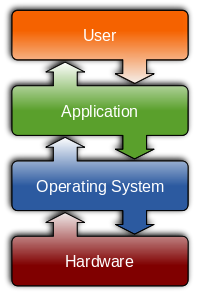A challenge with all commons arrangements is the care required to maintain the shared resources to avoid tragedy of one type or another. In the case of digital "Free Software" and open source software, while there are important needs in caring for good software. These are sometimes not well understood by the developers and even less well understood by the users.
The analogies to common land only partially apply because of the digital nature of software. Software is now distributed over the Internet which is a hybrid public/private, shared, world wide infrastructure. A copy of a software work makes it more widely available with no impact on the original. If copies are used widely and code improvements are given back to the maintainer/distributor of the software everyone benefits from improved software and there is no degradation. Physical goods like land degrade when shared but software benefits when shared. One of the best examples of an information common is wikipedia.org.
A challenge is that enlightened self interest over a short time period does not illuminate the entire ecosystem of software. This can result in small decisions and free riders that endanger the sustainability of the shared common. Stewardship and collective trusteeship can only be appreciated when viewing the system over a longer period of time. What do you think? Please comment below.
We hope you join us for our meetings in Berkeley at Bobby G’s Pizzeria. We meet on the second and fourth Sundays of each month.
